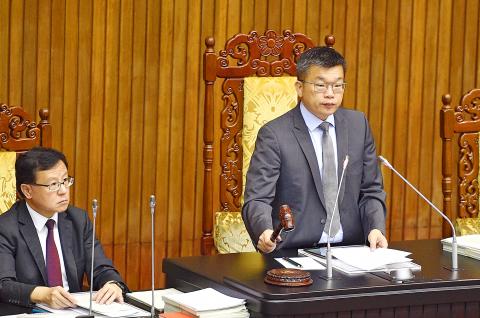Lawmakers yesterday passed the Act on Savings Accounts for the Education and Development of Children and Teenagers (兒童及少年未來教育與發展帳戶條例), which requires the Ministry of Health and Welfare to match deposits into education savings accounts by low and middle-income families and requires local governments to advise families in those income brackets within their jurisdiction to open such accounts.
The act applies to the accounts of children born after Jan. 1, 2016, to certified low and middle-income households, or children who have been placed under the custody of local governments for at least two years.
The act stipulates that local governments should advise the legal guardians of children in low and middle-income households within their jurisdiction to set up a savings account for the children within one month of identifying such households.

Photo: George Tsorng, Taipei Times
Legal guardians may decide the amount of money to deposit into the account every month until the child is 18, up to a maximum of NT$15,000 per year, the act says.
The ministry would then match the deposits made by legal guardians each year, meaning that each child would be able to receive a maximum of NT$30,000 in yearly savings.
To avoid the savings accounts negatively affecting qualified households, which could discourage them from establishing such accounts, the act stipulates that money deposited into the accounts should not be considered assets, meaning they would not be taxed.
The savings cannot be used to repay debts or as collateral, and cannot be sequestered by law enforcement agencies or subjected to any other enforced measures under the law, the act says.
The legislation was drafted to help President Tsai Ing-wen (蔡英文) realize her policy of helping poor children and orphans fulfill their dreams by establishing a fund for their education and careers, providing them a better chance to achieve higher education levels and avoid low-paying jobs, the ministry said in a statement.
Children placed under government care are a minority who have a greater need to achieve financial independence, Democratic Progressive Party Legislator Lee Li-feng (李麗芬) said.
The joint deposits by guardians and the government would help these children reach higher levels of education, diversify their options in life and help them escape poverty, she said.
Chinese Nationalist Party (KMT) Legislator Lee Yen-hsiu (李彥秀) lauded the legislation, saying that after 18 years of planning, the system for savings accounts has finally come into fruition.
However, she raised concerns about a potentially heavier burden on social workers due to the act’s passage, saying that is a matter the ministry should take note of.
The Social Assistance Act (社會救助法) defines low-income households as those whose average income per person is less than the minimum cost of living published by the ministry, while middle-income families are those whose average income per person is less than 1.5 times that minimum.

Palauan President Surangel Whipps Jr arrived in Taiwan last night to kick off his first visit to the country since beginning his second term earlier this year. After arriving at Taoyuan International Airport at around 6:30 pm, Whipps and his delegation were welcomed by Minister of Foreign Affairs Lin Chia-lung (林佳龍). Speaking to gathered media, the Palauan leader said he was excited and honored to be back in Taiwan on his first state visit to Taiwan since he was sworn in this January. Among those traveling with Whipps is Minister of State Gustav N. Aitaro, Public Infrastructure

President William Lai (賴清德) yesterday thanked Palau for its continued support of Taiwan's international participation, as Taipei was once again excluded from the World Health Assembly (WHA) currently taking place in Switzerland. "Palau has never stopped voicing support for Taiwan" in the UN General Assembly, the WHO and other UN-affiliated agencies, Lai said during a bilateral meeting with visiting Palau President Surangel Whipps Jr. "We have been profoundly touched by these endorsements," Lai said, praising the Pacific island nation's firm support as "courageous." Lai's remarks came as Taiwan was excluded for the ninth consecutive year from the WHA, which is being held in

RESOLUTIONS DEBATE: Taiwan’s allies said that UN and WHA resolutions cited by China and other nations ‘do not determine Taiwan’s participation in WHO activities’ A proposal to invite Taiwan to this year’s World Health Assembly (WHA) was rejected on Monday, resulting in Taipei’s absence from the annual meeting for a ninth consecutive year, although partners spoke up for Taiwan’s participation at the first day of the meeting. The first agenda item after the opening was a “two-on-two debate” on a proposal to invite Taiwan to participate at the WHA as an observer. Similar to previous years, two countries made statements in favor of the proposal, while two others expressed their opposition. Philippine Secretary of Health Teodoro Herbosa, president of the 78th WHA, accepted the WHA General Committee’s

At least three people died and more than a dozen were injured yesterday afternoon when a vehicle struck a group of pedestrians in New Taipei City’s Sansia District (三峽). The incident happened at about 4pm when a car rammed into pedestrians at an intersection near Bei Da Elementary School. Witnesses said the sedan, being driven at a high speed, ran a red light, knocking scooters out of the way and hitting students crossing the road before careening into a median near the intersection of Guocheng and Guoguang streets. The incident resulted in three deaths and 13 injuries, including the driver, a 78-year-old man